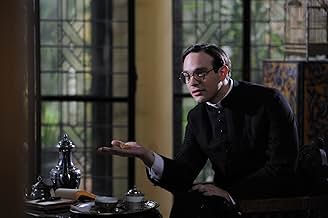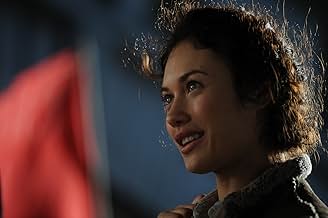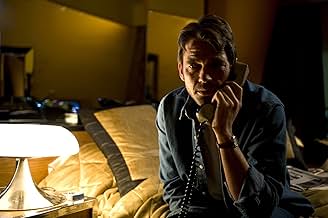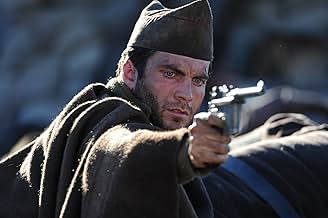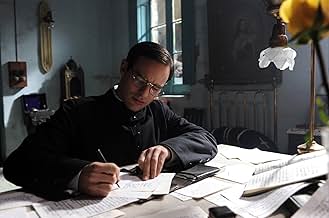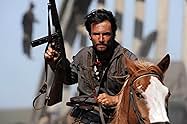NOTE IMDb
5,7/10
5,2 k
MA NOTE
Biopic consacré à Jose Maria Escriva de Balaguer, fondateur de l'ordre de l'Opus Dei.Biopic consacré à Jose Maria Escriva de Balaguer, fondateur de l'ordre de l'Opus Dei.Biopic consacré à Jose Maria Escriva de Balaguer, fondateur de l'ordre de l'Opus Dei.
- Réalisation
- Scénario
- Casting principal
- Récompenses
- 2 nominations au total
Jordi Mollà
- Don José
- (as Jordi Mollá)
Juan Cruz Rolla Knight
- Young Josemaría
- (as Juan Cruz)
Avis à la une
Nice cinematography. Weak script, Weak special effects. some dark scenes that didn't have to be.
The music, oh my horror, what can I say about the music. The swelling crescendos,everywhere, the loud volume, drowning out the dialog, and the most inappropriate music at the most inappropriate times, oh my horror, the most horrible music. After a half hour, I was left to myself to watch the thing, the music chased all the others away. Did I mention the music, oh my horror, the miserable horrible music, wrecking what could have been.
In the last half of the movie, I could see the actors were all tired of this, their efforts were drawn and tired, they had succumbed, they had had enough, long before the audience collapsed.
I'm sure the cutting room floor was littered with performances that were absolutely horrible, the actors were sick of this project and just wanted, no needed, to run away.
In Blu-Ray, at a cost of $2.99, cheaper than a bad movie at the theatre and I could at least drown myself in beer.
The music, oh my horror, what can I say about the music. The swelling crescendos,everywhere, the loud volume, drowning out the dialog, and the most inappropriate music at the most inappropriate times, oh my horror, the most horrible music. After a half hour, I was left to myself to watch the thing, the music chased all the others away. Did I mention the music, oh my horror, the miserable horrible music, wrecking what could have been.
In the last half of the movie, I could see the actors were all tired of this, their efforts were drawn and tired, they had succumbed, they had had enough, long before the audience collapsed.
I'm sure the cutting room floor was littered with performances that were absolutely horrible, the actors were sick of this project and just wanted, no needed, to run away.
In Blu-Ray, at a cost of $2.99, cheaper than a bad movie at the theatre and I could at least drown myself in beer.
I have just been invited to watch the movie during a screening presentation in Rome and after several hours I'm still deeply touched. It's a film that makes you think, reflect. It's not an easy action movie, and in that sense, some maybe would get disappointed if they are thinking of it as another war movie. It's a drama that despite the cruel events that portraits opens your heart to hope and puts you on the quest for transcendence. As "The Mission", this new Joffe's film, uses the "paralel" life of two friends to show how difficult it is to make a fair decision while you are under stressful circumstances. Some people may judge this film as the Opus Dei answer to the Da Vinci Code attacks, and in a certain sense it is, but the film is not a propaganda movie, but a deep meditation from an agnostic point of view of the sense of life.
A decent sketch. About war, friendship, courage and compromises, about faith, jealousy and parenthood. Decent, interesting for actors more than for story, obvious answer of Opus Dei against propaganda created by Da Vinci Code, it is a beautiful sketch of tragic events.
I found this film so pretentious in its aspiration and claims, so boring badly-acted and obviously propagandist in its execution to compel me to write my first review. (When I woke up after the big ZZzzz, I mean...) What it does is to paint a glorified history of the "Saint" and the birth of the Opus Dei, in pure ecclesiastic style, never mind historic accuracy.
It would still be all OK to me if the film had any cinematographic merits, if the acting was good, if dialogue was credible But it really isn't (e.g., "I wasn't allowed to play with Jose Maria anymore, my father thought poverty was contagious... My dad had more money, ... but Jose Maria had more dad." Excuse me! And also: "Like or not, most young men were celibate, at least as a priest you got paid for it". What? Excuse me!)
So, my advice is: really don't waste your two hours trying to stay awake during this: if you're interested in the Opus Dei and Escriva De Balaguer, find a more serious and reliable source, if you only want to go the movies, find a better film. This one should stay in the religious circles were it belongs, not in theatres.
It would still be all OK to me if the film had any cinematographic merits, if the acting was good, if dialogue was credible But it really isn't (e.g., "I wasn't allowed to play with Jose Maria anymore, my father thought poverty was contagious... My dad had more money, ... but Jose Maria had more dad." Excuse me! And also: "Like or not, most young men were celibate, at least as a priest you got paid for it". What? Excuse me!)
So, my advice is: really don't waste your two hours trying to stay awake during this: if you're interested in the Opus Dei and Escriva De Balaguer, find a more serious and reliable source, if you only want to go the movies, find a better film. This one should stay in the religious circles were it belongs, not in theatres.
The problem with this film at IMDb is to know the real and final score. Right now is eight (8). 119 users of 147 voted ten (10), 14 voted nine (9), 6 voted eight (8). The others users voted lower than six (6). Well, or this is a spectacular film or we have a problem here. This score seems to me a little unreal and unbelievably.
Knowing Opus Dei since 1980, I think these 119 users are probably Opus Dei voters only and want to keep the score so higher as possible.
Why does this matter? Because a score should be representative and product of neutral or spontaneous voting. Well, I can barely believe this is the case. Let's see what happen in the next months.
And what about the film? Well, if somebody wants to know about Escriva and his Opus Dei, this film does not tell too much.
This is a very light film without any real information and questions like: How Opus Dei as organization was actually built since 1928? Why Opus Dei is in a very deep internal crisis since ten or fifteen years ago? Why a lot of people are leaving Opus Dei in the last years (in Spain, Mexico, Argentina, etc.)? Why is not so easy to leave Opus Dei? Yes, it is not easy but a lot of people fight for. Is it true that Escrivá declared whoever leaves Opus Dei will suffer a lot in this life and his eternal salvation will be in danger? Why so many celibate members suffer from depression? Is it possible that Opus Dei psychiatrists do not keep the professional secrecy and inform to Opus Dei superiors if a member talks about leaving Opus Dei? Yeah, that is a tough question to be made. How is possible that Escrivá became saint mainly because the testimony of his confessor? Why celibate members have to make a will (pro Opus Dei) like monks do before the perpetual incorporation? Why celibate members have to give their salary away like some monks do? Why lay members have to request a pardon of departure (dispense) to leave Opus Dei (like monks do) only need in the case of sacred vows? Is that because without knowing they really are bounded by some kind of sacred vows? Why lay persons have obligations - without knowing and without consent- that the Code of Canon Law established only for a consecrated life? Is there any kind of deception in all of this?
After these questions, you know a serious film about Opus Dei and Escrivá is waiting to be made.
I am not going to vote. I rather write this brief review.
Knowing Opus Dei since 1980, I think these 119 users are probably Opus Dei voters only and want to keep the score so higher as possible.
Why does this matter? Because a score should be representative and product of neutral or spontaneous voting. Well, I can barely believe this is the case. Let's see what happen in the next months.
And what about the film? Well, if somebody wants to know about Escriva and his Opus Dei, this film does not tell too much.
This is a very light film without any real information and questions like: How Opus Dei as organization was actually built since 1928? Why Opus Dei is in a very deep internal crisis since ten or fifteen years ago? Why a lot of people are leaving Opus Dei in the last years (in Spain, Mexico, Argentina, etc.)? Why is not so easy to leave Opus Dei? Yes, it is not easy but a lot of people fight for. Is it true that Escrivá declared whoever leaves Opus Dei will suffer a lot in this life and his eternal salvation will be in danger? Why so many celibate members suffer from depression? Is it possible that Opus Dei psychiatrists do not keep the professional secrecy and inform to Opus Dei superiors if a member talks about leaving Opus Dei? Yeah, that is a tough question to be made. How is possible that Escrivá became saint mainly because the testimony of his confessor? Why celibate members have to make a will (pro Opus Dei) like monks do before the perpetual incorporation? Why celibate members have to give their salary away like some monks do? Why lay members have to request a pardon of departure (dispense) to leave Opus Dei (like monks do) only need in the case of sacred vows? Is that because without knowing they really are bounded by some kind of sacred vows? Why lay persons have obligations - without knowing and without consent- that the Code of Canon Law established only for a consecrated life? Is there any kind of deception in all of this?
After these questions, you know a serious film about Opus Dei and Escrivá is waiting to be made.
I am not going to vote. I rather write this brief review.
Le saviez-vous
- AnecdotesThe title comes from the phrase "here be dragons" which was written on old maps to denote dangerous or uncharted areas.
- GaffesThe sub machine gun that the rebel leader Oriol takes from the wrecked combat car to pose with Ildiko is a Thompson M1 or M1-A1, as shown by the charging handle on the right and the simplified rear sight. This was not introduced until 1942, six years after the events in the movie.
- Versions alternativesBecause of poor box-office performance in 2011, the film was re-edited and re-released in the USA in 2012, under the title "There Be Dragons: Secrets of Passion". This new version is shorter (106 minutes) and has a new music scored by Robert Folk.
- ConnexionsFeatured in Saint of the Ordinary: The Making of There Be Dragons (2011)
Meilleurs choix
Connectez-vous pour évaluer et suivre la liste de favoris afin de recevoir des recommandations personnalisées
- How long is There Be Dragons?Alimenté par Alexa
Détails
- Date de sortie
- Pays d’origine
- Sites officiels
- Langue
- Aussi connu sous le nom de
- There Be Dragons
- Lieux de tournage
- Sociétés de production
- Voir plus de crédits d'entreprise sur IMDbPro
Box-office
- Budget
- 36 000 000 $US (estimé)
- Montant brut aux États-Unis et au Canada
- 1 069 334 $US
- Week-end de sortie aux États-Unis et au Canada
- 705 537 $US
- 8 mai 2011
- Montant brut mondial
- 4 372 642 $US
- Durée
- 2h 2min(122 min)
- Couleur
- Mixage
- Rapport de forme
- 2.35 : 1
Contribuer à cette page
Suggérer une modification ou ajouter du contenu manquant








